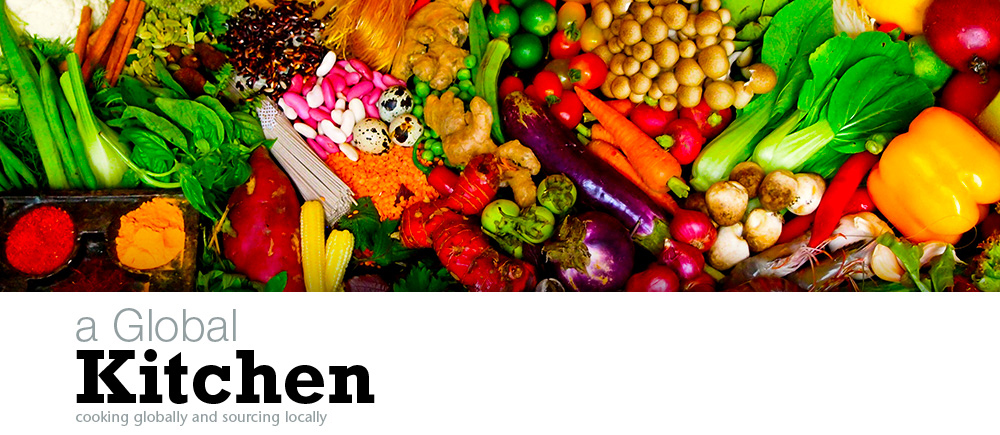 Last Sunday strolling through the Landsdowne Farmer’s Market I happened upon a stall selling some gorgeous tiny pear-shaped organic eggplant, about 3 inches high, variegated with white and deep purple. Unfortunately the young vendor was unsure of the variety name and provenance. The day before I had just made some eggplant pickle, which these would have been perfect for, but I already had an idea of what I was going to prepare.
Last Sunday strolling through the Landsdowne Farmer’s Market I happened upon a stall selling some gorgeous tiny pear-shaped organic eggplant, about 3 inches high, variegated with white and deep purple. Unfortunately the young vendor was unsure of the variety name and provenance. The day before I had just made some eggplant pickle, which these would have been perfect for, but I already had an idea of what I was going to prepare.
Tuesday night’s meal was bittersweet. My wife was happy to see this dish on our table that night as it is a favourite of hers. Unfortunately, the same cannot be said about what possibly could be soon served on thalis throughout India. Earlier that day, under the chairmanship of the Indian Prime Minister Manmohan Singh, the BRAI bill (Biotechnology Regulatory Authority of India) was approved and is expected to be tabled in the current session of Parliament. Under the proposed bill the Federal government will hold the power to override any State-level acts and regulations with respect to GMOs throughout the country. The bill can clear any GM foods, despite the concerns raised against them.
Such a bill threatens food safety, the environment and the right to choose what one eats. Just last year, when genetically modified eggplant was initially approved by the Indian parliament as part of the US-India Agricultural Knowledge Initiative farmers, State governments, GM activists, and ordinary citizens raised concerns that its introduction would lead to an increase in monoculture and a decrease in eggplant varieties. The Indian government was forced to place a temporary moratorium on the GM eggplant. However now it seems that they prefer not to listen to their citizens, the very ones who elected them.
Why should you be concerned about this, not living in India? India is the world’s largest producer of brinjal/ aubergine/ eggplant in the world growing more than 4,000 varieties. Local farmers often choose a variety that meets their regional needs and preferences and is best suited to their specific local ecosystems. Recent history has demonstrated that when governments give larger corporations such power in agriculture there is not only a decrease in plant variety but also the small farmer and consumer are the ones who directly end up feeling the negative effects. India’s infrastructure is not yet as well planned as, say China’s. But it will be. Come that day, in this globalised world, these GM eggplants will eventually make it to North American and European supermarkets. You can make your voice heard by signing a petition which asks the Indian government to stop the passing of this bill.
Thanks for your patience. Now, on to the cooking.
- 1 large eggplant or 2 Japanese eggplant (or similar amount of small eggplants)
- 1 tbsp mustard seed oil (or Indian sesame oil or vegetable oil)
- ½ tsp turmeric powder
- ½ tsp smoky Spanish paprika (or ¼ tsp paprika and ¼ tsp cayenne powder)
- ¾ cup plain yogurt
- 3 tbsp lemon juice
- 1 tsp sugar
- Salt and pepper, to taste
- 3 tbsp coriander, roughly chopped
- 1-2 tsp browned ghee or butter (optional)
- pinch of cayenne powder (optional)
NOTE: This was originally posted on my blog India On My Plate on August 18, 2011.
